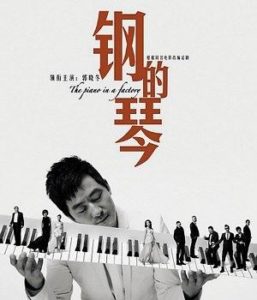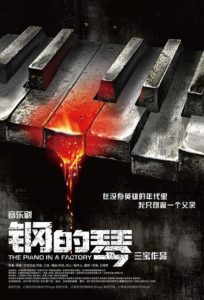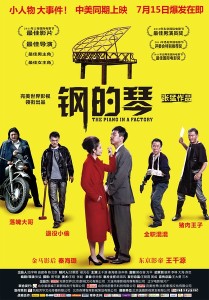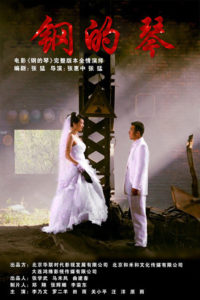The Piano in a Factory
钢的琴
China, 2010, colour, 1.85:1, 125 mins. (premiere version), 107 mins. (release version).
Director: Zhang Meng 张猛.
Rating: 9/10.
A lightly comic gem with an ensemble cast and stylised look in perfect synch.
An economically depressed steel-making city in northeast China, the early 1990s. Chen Guilin (Wang Qianyuan) is an accordionist who runs a small band with other unemployed friends and has an easygoing relationship with Shuxian (Qin Hailu), the singer in the group. After going off with a wealthy manufacturer of fake medicine, Chen Guilin’s wife Xiaoju (Jang Shin-yeong) returns and asks him for a divorce – which he agrees to – plus custody of their young daughter Xiaoyuan (Liu Xingyu) – which he doesn’t. Xiaoyuan is the apple of Chen Guilin’s eye and he’s been spending the little money he has on lessons for her to become a pianist. Xiaoyuan says she’ll stay with whomever provides her with a piano, so Chen Guilin first tries borrowing money from friends and relatives, and then stealing one from a local school – all without success. He then decides there’s only one solution: to make one, using pilfered parts from disused factories, wood from demolished buildings, and scrap metal left over from a closed foundry. He assembles all his friends to help in the project, including the scholarly Wang (Wang Zaoqin) who works out how to build a piano from a manual, local “businessman” Brother Ji (Luo Eryang) who lets him use a decrepit factory and supervises the smelting of the iron frame, ex-con Lightning Fingers (Guo Yongzhen) who pilfers small parts, and friend Wang Kangmei (Tian Yu) to help Shuxian with the cooking.
REVIEW
The same warm, humanistic tone with which writer-director Zhang Meng 张猛 portrayed quotidien life in a dreary northeast China town in Lucky Dog 耳朵大有福 (2007), his debut, returns exquisitely honed in his second feature, The Piano in a Factory 钢的琴, a lightly comic tale of one man’s dream realised through group effort. Northern Chinese to its fingertips in its gruff humour and pragmatic but generous relationships, the film has a stylised look – aided by superb photography by Zhou Shuhao 周书豪 (The Robbers 我的唐朝兄弟, 2009) – that’s completely different from Lucky Dog‘s more naturalistic one, and an elliptical structure that doesn’t waste a frame. A movie with both arthouse and more general appeal, this small gem is a specialist audience-pleaser that confirms Zhang as a considerable talent.
The story of an impoverished musician who tries every way to acquire a piano for his young daughter, and ends up deciding to make one himself with the support of his unemployed pals, is simply a hook for an ensemble portrait of half-a-dozen or so friends who decide to make the most of their town’s economic depression rather than sit around moaning about it. Exactly catching the transition in China’s development from a state-run monolith to an entrepreneurial, individualist economy, Piano finds an almost Slavonic humour in the setting and people that’s emphasised by the use of Russian songs and music on the soundtrack. The movie could equally well have been made in Central Europe a couple of decades ago; but its tone is also absolutely right for a region of China which sits under eastern Russia’s armpit and is still marked by heavy Russian influences.
Zhou’s camerawork makes much use of lateral tracking shots and fixed compositions (with the same scene often shown from different angles) that could have been just arty affectations if the tempo of the editing has remained stuck in neutral. But Zhang lets the formal visuals go with the film’s emotional flow: when the cast break into a musical number or song – most memorably when driving at night and, later, celebrating their work in a joyous flamenco number – the tempo picks up along with the content.
Performances and casting are just right. As the devoted father whose sense of self-importance often gets the better of him, Wang Qianyuan 王千源 (the heroine’s criminal boyfriend in the odd-couple comedy Set Off 即日启程, 2008) steps up to a lead role with considerable presence. But both he, and the rest of the male cast, are given a run for their money by actress Qin Hailu 秦海璐 (Durian Durian 榴莲飘飘, 2000), who also co-executive produced, as the lead’s easy-come-easy-go girlfriend who finally makes him see the truth under his nose.
 Like Lucky Dog, the film is essentially episodic but this time held together by a larger emotional arc. Scenes often fade out precipitously, but in the broader span of things the economy of the story-telling pays dividends by the end.
Like Lucky Dog, the film is essentially episodic but this time held together by a larger emotional arc. Scenes often fade out precipitously, but in the broader span of things the economy of the story-telling pays dividends by the end.
[Version reviewed above is the release one, running 107 minutes, not the Toronto festival premiere which was 18 minutes longer. The film’s Chinese title, gāngde qín 钢的琴, literally means “Steel Qin” and is a play on the almost identical word for “piano”, gāngqín 钢琴, which means the same. The story was subsequently adapted into a 2012 stage play (with songs by Liao Junjia 廖隽嘉), written by  Yu Rongjun 喻荣军, directed by Zhou Xiaoqian 周小倩 and starring Guo Xiaodong 郭晓冬(see poster, left top); a 2012 stage musical, written by Guan Shan 关山, scored by San Bao 三宝, directed by Wang Tingting 王婷婷 and starring Sun Bo 孙博 (see poster, left middle); and a 39-episode 2014 TV drama, written by Zhang Meng, Xue Zhihua 薛志华, Wang Tianqi 王添麒 and Wang Shuo 王硕, directed by Zhang Huizhong 张惠中 and Zhang Meng, and starring Li Naiwen 李乃文 (see poster, left bottom). The last has a much longer time span, opening in 1985 when the central character is a 21-year-old high-school student and ending in 2005; it even manages to preserve echoes of the original film’s visual style.]
Yu Rongjun 喻荣军, directed by Zhou Xiaoqian 周小倩 and starring Guo Xiaodong 郭晓冬(see poster, left top); a 2012 stage musical, written by Guan Shan 关山, scored by San Bao 三宝, directed by Wang Tingting 王婷婷 and starring Sun Bo 孙博 (see poster, left middle); and a 39-episode 2014 TV drama, written by Zhang Meng, Xue Zhihua 薛志华, Wang Tianqi 王添麒 and Wang Shuo 王硕, directed by Zhang Huizhong 张惠中 and Zhang Meng, and starring Li Naiwen 李乃文 (see poster, left bottom). The last has a much longer time span, opening in 1985 when the central character is a 21-year-old high-school student and ending in 2005; it even manages to preserve echoes of the original film’s visual style.]
Presented by Liaoning Film Studio (CN), Dalian Hung Yuan Film & TV (CN), ESA Cultural Investment (Beijing) (CN), Etoile Pictures (CN). Produced by Liaoning Film Studio (CN), Etoile Pictures (CN).
Script: Zhang Meng. Photography: Zhou Shuhao. Editing: Lu Yun, Gao Bo. Music: Oh Yeong-muk. Art direction: Wang Shuo, Zhang Yi. Costumes: Ma Jing. Sound: Yi Sang-uk, Yi Seong-jun, Jeong Ji-yong. Visual effects: Han Myeong-heui. Executive director: Gwak Jae-yong.
Cast: Wang Qianyuan (Chen Guilin), Qin Hailu (Shuxian), Jang Shin-yeong (Xiaoju), Liu Xingyu (Xiaoyuan), Zhang Huizhi (Chen Guilin’s father), Tian Yu (Wang Kangmei), Zhou Kui (Big Liu), Ding Yan (Chen Guilin’s elder sister), Xu Jiangning (her husband), Liu Qian (Fat Head), Wang Zaoqin (Wang), Luo Eryang (Brother Ji), Guo Yongzhen (Lightning Fingers), Zhang Yaxi (An Changye), Wang Yue (piano teacher).
Premiere: Toronto Film Festival (Discovery), 11 Sep 2010.
Release: China, 15 Jul 2011.
(Review originally published on Film Business Asia, 25 Apr 2011.)

